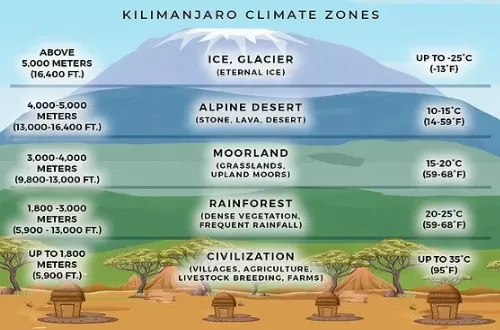Climate zones of mount Kilimanjaro
Mount Kilimanjaro is a unique and iconic mountain with a range of ecological climate zones: the Cultivation Zone, Forest Zone, Heather-Moorland Zone, Alpine Desert Zone, and Arctic Summit climate zones. The mountain's ecological zones can be categorized into several distinct climate zones as you ascend from its base to its summit. These zones are characterized by changes in temperature, precipitation, vegetation, and wildlife.

5 climate zones of Mount Kilimanjaro
Why not spend your Holiday on Mount Kilimanjaro?
Get a free, best price-guaranteed Kilimanjaro climb tours quote and a quick response in 2025 and 2026. Call +255 747 989 416 on WhatsApp or email us at exploreafrica024@gmail.com to get a free quote. We are available 24/7 and we are happy to help you.
The primary ecological climate zones of Mount Kilimanjaro:
Kilimanjaro's Zone 1: Cultivated Zone (base to approximately 1,800 meters/5905 ft):
This is the lowest zone and consists of the surrounding farmland and settlements. Temperature range: Days: 70-90 F/21-32 C, and nights: 40-60 F/4-15 C. It is not part of the natural ecosystem of the mountain.
Kilimanjaro's Zone 2: Rainforest Zone (approximately 1,800 meters/5905 ft to 2,800 meters/9186 ft):
This lush and dense rainforest zone is characterized by high rainfall throughout the year. It is filled with a variety of plant and animal species, including monkeys, birds, and various types of trees and ferns. The temperatures in this zone are relatively mild. In Kilimanjaro's rainforest zone, it has a temperature range of: days: 70-90 F/21-32 C, and nights: 40-60 F/4-15 C.
Kilimanjaro's Zone 3: Heath and Moorland Zone (approximately 2,800 meters/9186 ft to 4,000 meters/13123 ft):
As you ascend higher, the rainforest gives way to heathland and moorland. The vegetation becomes more sparse, consisting mainly of grasses, heather, and low shrubs. This zone is characterized by cooler temperatures ranging from 50–80 F/10–27 C during the day and 30–60 F/(-1)–15 C at night, with lower precipitation.
Kilimanjaro's Zone 4: Alpine Desert Zone (approximately 4,000 meters/13123 ft to 5,000 meters/16404 ft):
In this zone, the vegetation becomes even scarcer, and you start to encounter rocky, desert-like terrain. There are few plants in this harsh environment, and temperatures can vary greatly between days 10–60 F (-12)–15 C and nights 10–40 F (-12)–4 C.
Kilimanjaro's Zone 5: Arctic Zone (Approximately 5,000 meters/16404 ft and above):
The highest reaches of Mount Kilimanjaro, above 5,000 meters, are often considered to be in an arctic zone. This area is characterized by glaciers, ice, and extreme cold. Very little vegetation can survive at this altitude, and the environment is extremely challenging for any form of life. Temperature Range: Days: 10-40 F/(-12)-4 C, and Nights: -15-20 F/(-26)-(-7) C.
How does the vegetation change as you ascend from the rainforest zone to the summit zone?
As you ascend from the rainforest zone to the summit zone on Mount Kilimanjaro, the vegetation changes significantly. The rainforest zone is characterized by lush green vegetation, including tall trees, ferns, and other plants that thrive in a humid environment. As you move up to the heath and moorland zones, the vegetation becomes shorter and more sparse, with heath and grasses dominating the landscape. The alpine desert zone is characterized by rocky terrain and very little vegetation. Finally, the summit zone is completely devoid of vegetation due to the harsh environment. The changes in vegetation are largely due to changes in temperature and precipitation as you ascend the mountain.
What types of animals can be found in each ecological climate zone of Mount Kilimanjaro?
Mount Kilimanjaro is home to a variety of animals, each adapted to the specific ecological climate zone they inhabit. Cultivated Zone: domesticated livestock such as goats, sheep, and cattle. Forest Zone: elephants, buffalo, leopards, and primates such as colobus monkeys. Heather and Moorland Zone: antelopes, hyrax, and birds such as eagles and sunbirds. Alpine Desert Zone: birds such as ravens and eagles, as well as small rodents.
Do you need a satisfied Kilimanjaro climb tours in different zones?
Get a free, best price-guaranteed Kilimanjaro climb tours in different zones quote and a quick response. Call +255 747 989 416 on WhatsApp or email us at exploreafrica024@gmail.com to get a free quote. We are available 24/7 and we are happy to help you.